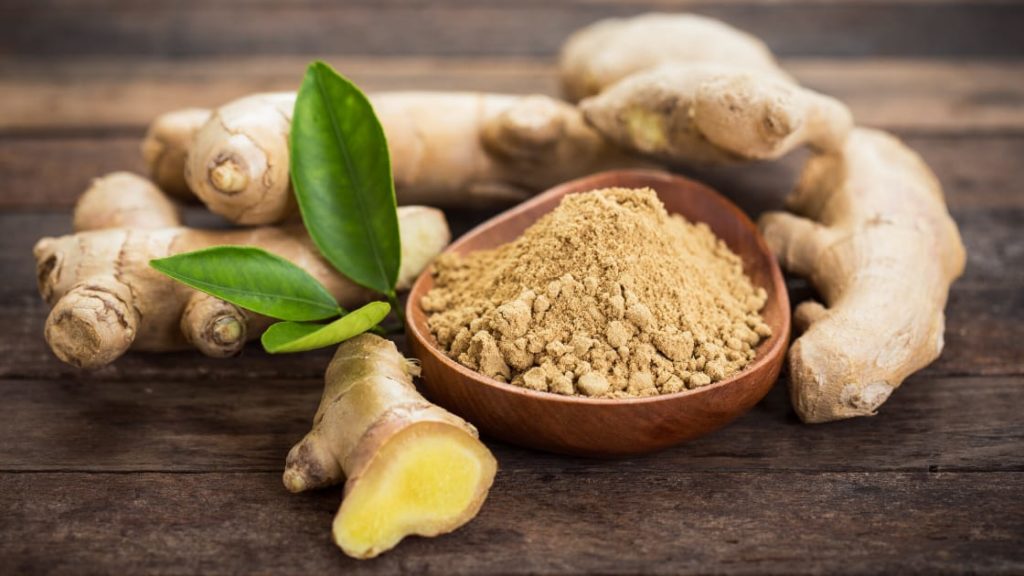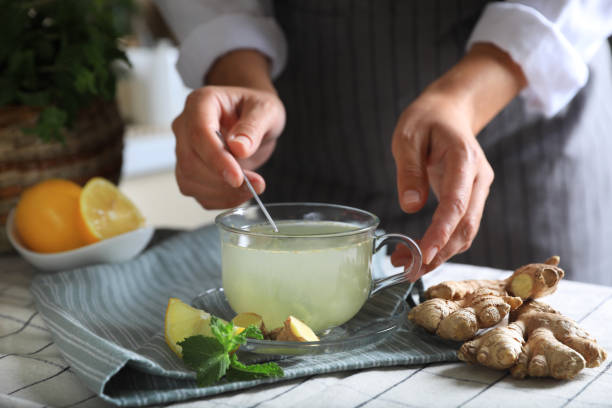Not only is ginger a popular spice in dishes, it also has a wonderful effect in helping to warm the body and increase resistance in the cold winter.
1. Why should you eat ginger in winter?
With its spicy flavor and numerous health benefits, ginger is both delicious and nutritious, and is versatile enough to be added to many dishes. The health benefits of ginger are largely due to its antioxidants, anti-inflammatory properties, and the compounds it contains. The unique aroma of ginger comes from its natural oils, the most important of which is gingerol.
Studies show that ginger has excellent anti-inflammatory, antiviral and antibacterial properties. It stimulates the immune system to better protect itself against viruses such as flu or bronchitis during the cold season.

Ginger contains powerful antioxidants and anti-inflammatory properties.
In traditional oriental medicine, ginger is a very effective medicine. Ginger has a spicy taste, has the effect of dispersing wind and cold, is warm, helps warm the body from the inside, so it is often used to treat colds, headaches, chills, stuffy nose, abdominal pain due to cold, bloating, indigestion, cough, phlegm, cough due to bronchitis...
In addition, fresh ginger is also used as a valuable ingredient in medicine processing, reducing side effects, increasing warmth, and increasing the cough-relieving effect of some oriental medicines.
The compounds in ginger help thin phlegm, reduce coughs and soothe the throat. It also reduces muscle aches and pains, which is very useful during changing weather days.
Thanks to its strong anti-inflammatory effects, ginger can help relieve pain in people with osteoarthritis or rheumatism in humid weather. Eating ginger is also a solution to reduce nausea, stimulate digestion, reduce bloating and indigestion.
According to research by the US National Institutes of Health , ginger contains a number of bioactive phenolic compounds such as gingerols, gingerenone A, zingerone, shogaols, paradols, quercetin... In addition, ginger also contains a number of terpene compounds such as β-bisabolene, α-curcumene, zingiberene, α-farnesene and β-sesquiphellandrene. It also contains polysaccharides, lipids, organic acids and crude fiber. All of these active compounds make ginger a powerful antioxidant and anti-inflammatory agent.
Many studies have shown that gingerol reduces the risk of bacterial and viral infections. Specifically, it has been found to be highly effective against oral bacteria associated with gingivitis and periodontitis, and is effective against respiratory syncytial virus infections. For these reasons, ginger is often used to improve digestion, reduce nausea, and help fight the flu and the common cold.
2. How to use ginger most effectively in winter
Ginger is commonly available in fresh, dried, ground, and juice forms. Eating raw ginger is the best way to maximize its health benefits. Raw ginger has a stronger flavor and contains more antioxidants.
To choose fresh and delicious ginger, when buying ginger, choose old, small ginger with rough skin but firm to the touch. Use your fingers to lightly scrape off the outer skin. If you see a clear difference in color between the skin and the ginger flesh and smell a spicy smell, then it is fresh and delicious ginger with a high essential oil content.
Ginger should be washed to remove dirt and sand, wrapped tightly and stored in the refrigerator. In addition, fresh ginger can be preserved for a long time by placing it in a pot of sand, then burying the ginger in the sand and leaving it in a cool place.
The simplest way is to use fresh ginger as a spice in everyday dishes. Ginger can be added to soups, stir-fries, stews... to enhance the flavor of the dish, while also warming the stomach and aiding digestion.

Drinking ginger tea is good for digestion and helps treat colds.
Another popular way to use it is to make ginger tea. Drinking ginger tea stimulates digestion, reduces nausea and is an effective way to reduce stress and fatigue caused by uncomfortable symptoms of flu, cold or body aches.
Making ginger tea is very simple, just prepare a fresh ginger root, wash it, crush it, add boiling water or put it in a teapot, pour boiling water and steep for 10 minutes before drinking.
Or you can make ginger tea combined with honey, which is also very good for people with coughs due to respiratory tract infections because ginger and honey have anti-inflammatory properties. Honey helps coat the lining of the stomach and throat and soothes the throat effectively.
Source: https://giadinh.suckhoedoisong.vn/ly-do-nen-an-gung-vao-mua-dong-172241127181127413.htm




































































































Comment (0)